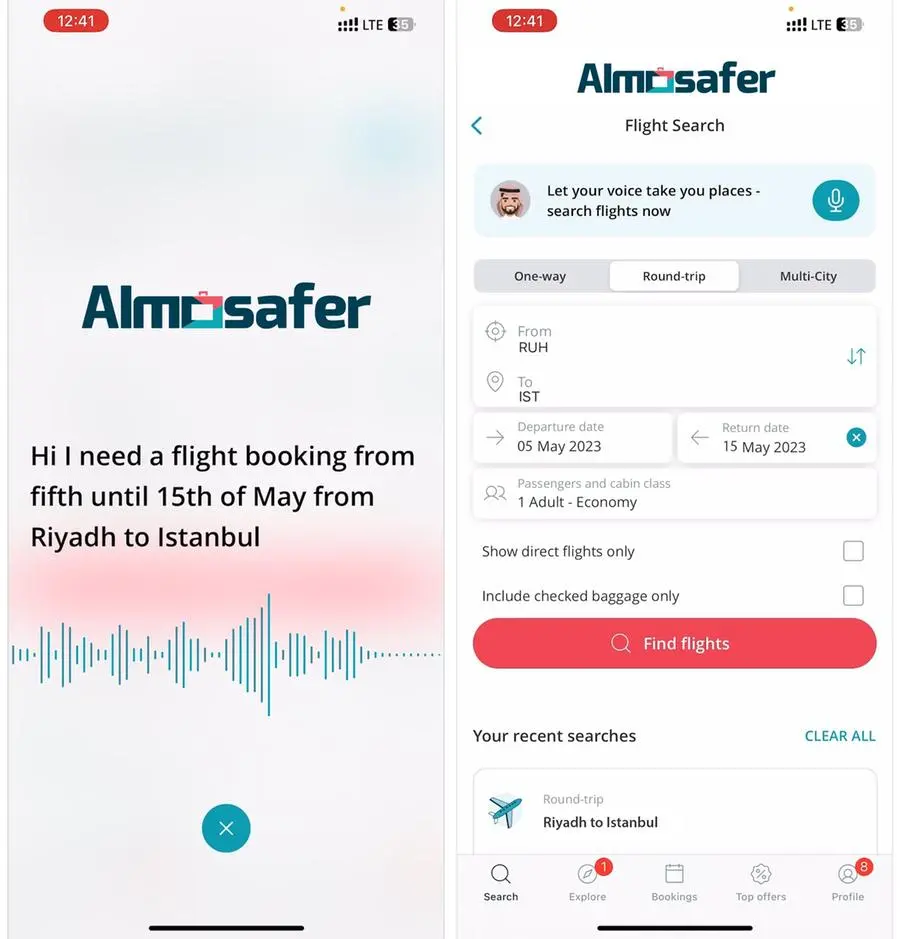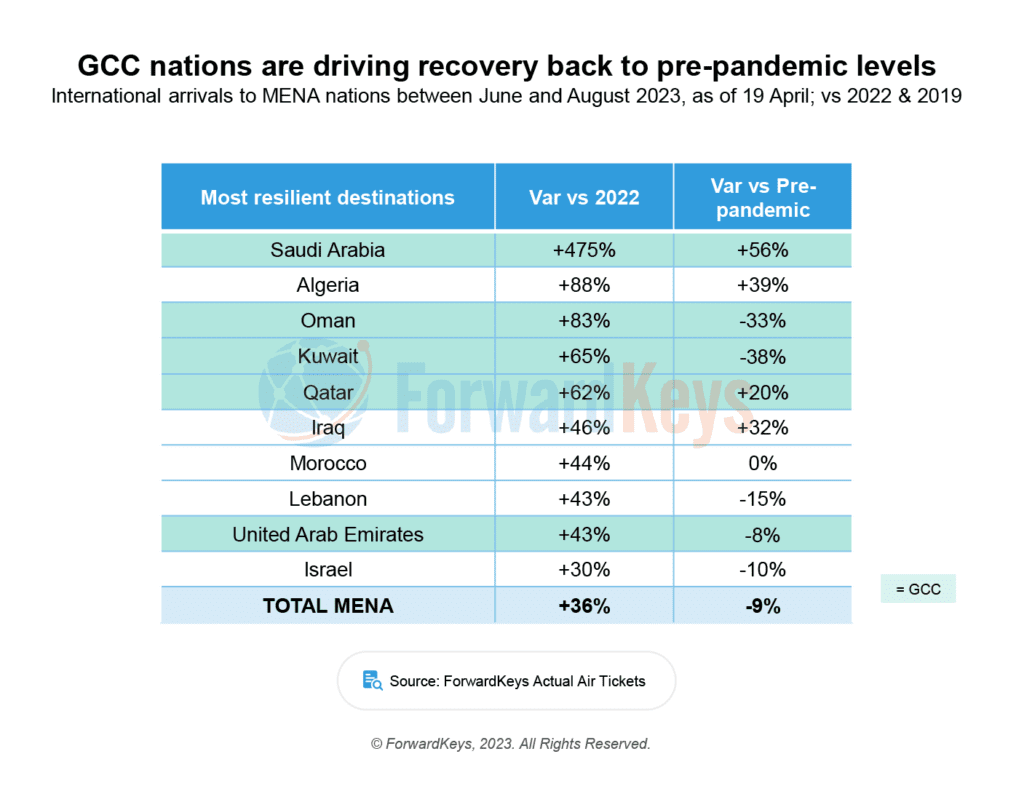Skift Take
If ChatGPT drives gains for Saudi's largest travel player, companies worldwide will take note. Plus, this week's news from Red Sea Global, Oyo, Musafir, and other regional companies.

Middle East Travel Roundup
Get the latest news from the Middle East in one easy-to-digest newsletter.
Saudi Arabia’s Almosafer is piloting the integration of artificial intelligence chatbot ChatGPT, on its mobile booking platforms. The country’s first travel company to test the integration of ChatGPT, Almosafer believes this will enhance the booking experience by providing more tailored responses to customer queries. During the pilot phase, the integrated platform will be introduced to a limited customer base of Almosafer’s consumer segment, where it will be utilized to support customers with their flight search and to aid customers in planning their trip post-booking. Almosafer is testing a voice search function powered by ChatGPT and will enable customers to search for the best flight options in both English and Arabic by simply recording their flight search requests. “The testing of ChatGPT reflects our commitment to constantly enhance our digital platforms and maintain our position at the forefront of technology,” said Muzzammil Ahussain, CEO of Almosafer. Through ChatGPT, Khalid, Almosafer’s virtual travel advisor, will be empowered to become a more holistic travel consultant with the necessary knowledge and expertise. Ahussain added.

The Middle East and North Africa region is expected to witness a 36 percent increase in international visitors between June and August, according to travel data firm ForwardKeys. The surge in demand is likely to be led by Saudi Arabia, with a 475 percent increase in travelers compared to last year and a 56 percent increase from pre-pandemic levels. International arrivals in Qatar for this period are also expected to be 20 percent above 2019 levels and 62 percent above last year. Olivier Ponti, vice president of insights at ForwardKeys, said the region’s tourism industry is poised to sustain its robust recovery during the summer season. Ponti noted a significant surge in travel intent, with flight searches for international trips growing by 39 percent in the first quarter, compared to the same period in the previous year, and improved flight connectivity. Saudi Arabia is also the most booked destination for travelling from the region this summer, up by 79 percent compared to pre-pandemic.

Accor has signed a master development agreement with Saudi Arabia’s Amsa Hospitality to develop and franchise 18 hotels across second-tier cities within Saudi Arabia over the next 10 years. The agreement will see Amsa Hospitality develop a range of Accor’s economy and midscale brands, including ibis Styles, Mercure, Mercure Living, Novotel, Novotel Living, and the recently-launched Handwritten Collection, while also acting as the third-party operator by leasing and franchising the assets. Calling Saudi Arabia’s ambitious plan for developing second-tier cities enterprising, Mohammad Alathel, CEO of Amsa Hospitality, said, “Such an enterprising strategy must be accompanied by quality hospitality, offering the best international standards.” As part of the agreement, Amsa Hospitality will be responsible for hotels in several cities in Saudi Arabia, including Ha’il, Jubail, Taif, Al-Ula, Tabuk, and Jazan. Each hotel brand will cater to a different target audience. “Our partnership with Amsa Hospitality marks a significant milestone in our development strategy for Saudi Arabia, a burgeoning hospitality sector which offers a host of opportunities to leverage our portfolio of hospitality brands,” said Duncan O’Rourke, CEO, Middle East, Africa & Asia Pacific — premium, midscale & economy division, Accor.
United Arab Emirates’ two biggest carriers, Dubai-based Emirates Airline and Abu Dhabi’s Etihad Airways have signed a memorandum of understanding to expand their interline agreement and provide travelers with additional itinerary options when visiting the country. This first-of-its-kind agreement between the two carriers aims to capitalise on opportunities to boost tourism to the United Arab Emirates from key source markets by enabling visitors to experience more than one destination in a single itinerary. This summer, customers of each airline will be able to purchase a single ticket to fly into either Dubai or Abu Dhabi, with a seamless return via the other airport. The new agreement also provides travelers planning to explore the United Arab Emirates with the flexibility of one-stop ticketing for their full journey and convenient baggage check-in. In the initial stages, each carrier will focus on attracting visitors to the country by developing inbound interline traffic from select points in Europe and China. Customers will also have the option of multi-city flights’ with the choice to travel from one city on both carriers’ networks and a convenient return to another point served by either Emirates or Etihad. This is the second time the airlines have announced a collaboration. In 2018, Emirates Group Security and Etihad Aviation Group signed a memorandum of understanding to strengthen aviation security, including the sharing of information and intelligence in operational areas both within and outside the UAE. Last year, Emirates had signed an agreement with the Department of Culture and Tourism — Abu Dhabi to boost tourist numbers to the capital from key source markets across the airline’s global network.
Red Sea Global, a company fully owned by Saudi Arabia’s Public Investment Fund, is exploring the possibility of a public market offering, with plans to launch as early as 2026. The company is currently examining various options for a public market event, including an initial public offering or the establishment of a real estate investment trust (REIT), CEO of Red Sea Global, John Pagano, stated in an interview with Bloomberg. Even as he did not provide specifics on advisers, banks, or valuation, Pagano said the company is currently holding preliminary discussions with banks and stakeholders. He said the company plans to go public by 2026 or 2027, after the hotels have been in operation for around two years, with a proven record of occupancy, cash flow, and profitability. The priority for the company now is to create a revenue stream that supports its value.
United Arab Emirates-based online travel company Musafir.com has signed an agreement to promote the heritage destination of AlUla in Saudi Arabia. Having received 185,000 visitors last year, AlUla has set a target of 250,000 visitors for this year. “AlUla is ready to receive up to 250,000 visitors in 2023, the majority of which will come from neighboring nations. Musafir.com will promote holiday packages to AlUla and collaborate on various promotional and marketing initiatives to increase tourist arrivals,” said Sachin Gadoya, Musafir.com’s CEO and co-founder. Musafir.com has curated a range of all-inclusive packages for AlUla with flights, hotels, airport transfers, breakfast and visa assistance. Partnerships such as these will be instrumental in AlUla’s emergence as a world-class sustainable tourism destination that helps to nurture the long-term prosperity and growth of the region, said Melanie De Souza, executive director, destination marketing at Royal Commission of AlUla.
The revenue for 3-to 5-star hotels in Oman went up to $191 million in March 2023, compared to $127 million last year, according to data from the National Centre for Statistics and Information. During the same period, the number of hotel guests in star hotels increased by 26 percent, reaching 522,753 in March 2023 from 416,287 in March 2022. Omanis remain the top guests with 181,369 visitors, while visitors from Oceania saw the highest growth of 210 percent. Europeans were among the top nationalities that visited the country in March as 169,334 travelers from the continent visited Oman, compared to 119,432 in 2022. The number of Asian guests also grew by 53.4 percent to 64,686. Guests from the Gulf region and other Arab countries grew by 31 percent and 38 percent respectively. The occupancy rate for the same period was 56.4 percent.
Aligning with its vision of becoming a sustainable tourism destination, the Department of Culture and Tourism — Abu Dhabi has announced new initiatives to promote sustainability within the tourism industry. The initiative comprises three key areas — the launch of six sector-specific Sustainable Tourism Guidelines, the development of a Carbon Calculator to estimate the hotel industry’s carbon footprint baseline in Abu Dhabi, and an energy-saving audit for all hotels in the emirate. Guided by the UN Sustainable Development Goals and in line with the United Nations World Tourism Organization’s Vision for 2030, Abu Dhabi’s sustainability framework aims to provide a clear roadmap for travel agents, tour operators, and other entities to achieve a more sustainable and inclusive business. “By collaborating with our hospitality and event partners, we can pave the way for a more sustainable future,” said Saeed Ali Obaid Al Fazari, executive director, strategy sector at Department of Culture and Tourism — Abu Dhabi.
Wizz Air Abu Dhabi, the ultra-low-fare national airline of the United Arab Emirates, is launching an ambitious recruitment drive with its Go Pink campaign. The airline said in a statement that pilots and cabin crew from GoFirst, the latest Indian carrier to file for insolvency proceedings, are encouraged to apply. The airline, the second-largest carrier in Abu Dhabi by seat capacity, currently has 400 aviation professionals employed locally. “We are proud of our phenomenal recent growth throughout Europe, Africa, Central Asia, and the Middle East, and expanding our team of highly committed aviation professionals will allow us to continue developing our extensive route network, said Johan Eidhagen, the airline’s officer and managing director. “We encourage our aviation colleagues from Go First who want to continue their careers in a financially stable, ever-growing airline to apply,” Eidhagen.
United Arab Emirates-based Azizi Developments has announced its plans to invest up to $16 billion through the launch of 50 upmarket, luxury hotels and resorts and one seven-star hotel in Dubai. The developer plans to add nearly 20,000 new keys to Dubai’s hotel stock over the next five years. Azizi’s hotels and resorts would be managed by its very own hospitality division, the company said in a statement. The announcement follows Azizi’s recently revealed plans to enter the hospitality sector, with its new chief operating officer — hospitality, Michael Zager, leading the developer’s newly established hospitality division. The developer also said that it has already acquired most of the necessary plots of land for its hotels and is planning to launch the construction before the end of 2023.
With an ambition to hire 6,000 Saudi nationals across its growing portfolio by 2030, IHG Hotels & Resorts said it plans to support the tourism sector in Saudi Arabia by growing the footprint of its existing brands, as well as introducing new brands from its global portfolio. As part of its recently-signed memorandum of understanding with the Saudi Tourism Authority, the hotel company said it would be running campaigns to promote various destinations within the country. The agreement provides a framework to develop customized promotions, joint marketing campaigns, and promotion through loyalty programs. IHG currently operates 37 hotels across five brands in Saudi Arabia. With 31 hotels in the development pipeline set to open within the next three to five years, the hotel company plans to add over 10,000 rooms to its portfolio in the country.
Oman’s ministry of heritage and tourism plans to implement 40 projects for boosting adventure tourism in the country. The projects include developing a cable car in the Botanical Garden and installing zip lines in Wadi Darbat in Dhofar for the khareef season. A zipline in Musandam was recently inaugurated, while a suspension bridge is being built in Wadi Shab in South Sharqiyah. The ministry also plans to create mountain trails in Hawar village in Wadi Bani Khalid and Wadi al Arbaeen, both known for their perpetual springs. To facilitate better access, the ministry also looks to set up service facilities, including changing rooms, camping sites, a café, and a restaurant at Wadi Bani Awf. The ministry plans to pave 15 mountain trails in total, with the majority located in the Hajar Mountains, such as Jabal Shams, Jabal Akhdar, and Wadi Bani Awf. Also, in addition to the 53 approved mountain trails in the country, 37 new mountain trails have been identified for adventure activities.
Demonstrating its ability to navigate a challenging operating environment, Turkish Airlines finished the first quarter of the year with its highest-ever first-quarter revenue. The airline reached a revenue of $4.4 billion in the first quarter registering an increase of 43 percent year-over-year. Passenger revenues rose by 83 percent recording over $3.6 billion. With one of the youngest and most modern fleet of 411 aircraft, Turkish Airlines increased its fleet size and workforce by 10 percent compared to the same period last year. In the first quarter of 2023, the airline carried over 17 million passengers in total, with a domestic load factor of 80 percent and an international load factor of 81 percent. Global passenger traffic exhibited strong growth in March, with industry-wide revenue passenger kilometers increasing by 52.4 percent year-on-year and reaching 88 percent of March 2019 levels, according to the International Air Transport Association (IATA). Turkish Airlines was one of the few airlines in the industry that exceeded its 2019 international capacity by 26 percent.
Skift AI Travel Newsletter
AI coverage across travel sectors that’s focused on separating trendy moves from good ideas – in your inbox every Friday.
Have a confidential tip for Skift? Get in touch
Tags: abu dhabi, accor, adventure travel, artificial intelligence, asia monthly, chatgpt, emirates air, etihad, gcc, iata, ihg, middle east newsletter, musafir, oman, Seera Group, sustainability, turkish airlines
Photo credit: Almosafer is piloting the integration of AI chatbot ChatGPT on its mobile booking platform. Source: Almosafer. Sanket Mishra / Pexels
